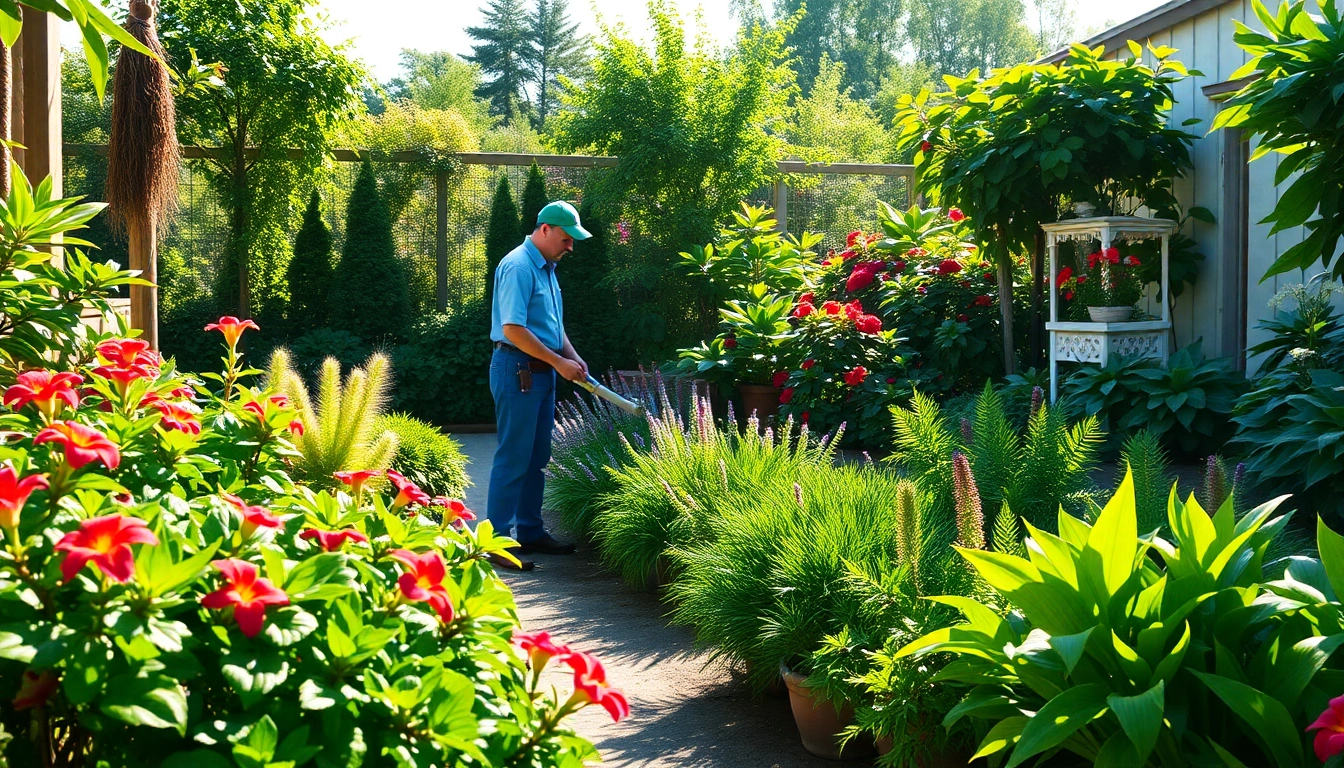Understanding Garden Maintenance Services
Garden maintenance services come into play when homeowners aim to keep their outdoor spaces vibrant and well-tended. Whether you own a sprawling estate or a small backyard, the need for appropriate care is universal. A well-maintained garden not only enhances the aesthetic appeal of your property but also contributes to its value. Professional maintenance ensures that plants, flowers, and landscapes thrive, requiring an expert understanding of horticultural practices. A reliable garden maintenance service can help cultivate a healthy garden ecosystem, reducing the burden on homeowners and enhancing their enjoyment of outdoor spaces.
What is Garden Maintenance?
Garden maintenance encompasses a variety of tasks aimed at ensuring the health and longevity of plants and landscapes. It involves regular upkeep activities such as mowing, pruning, weeding, and fertilizing. The goal of these services is not only to keep gardens looking attractive but also to promote plant health and prevent pest infestations. Seasonal adjustments and tailored care are also crucial to align with the unique needs of different plants and environmental conditions.
Benefits of Professional Garden Maintenance Services
Engaging a garden maintenance service comes with numerous benefits. These professionals possess the knowledge and expertise required to evaluate the specific needs of your garden, enabling them to execute tailored maintenance strategies. Some key advantages include:
- Expertise in Plant Care: Professionals understand soil types, plant requirements, and local climate conditions, which translates into better growth outcomes.
- Time-Saving: Garden maintenance can be time-consuming, and hiring experts frees up valuable time for homeowners to enjoy their gardens rather than labor in them.
- Pest and Disease Management: Trained specialists are adept at identifying and managing garden pests and diseases before they escalate into major problems.
- Enhanced Property Value: A well-maintained garden significantly boosts the visual appeal of a property, enhancing its market value.
Common Services Offered
Garden maintenance services can vary widely, but some common offerings include:
- Lawn Care: Regular mowing, aeration, and seeding.
- Pruning and Trimming: Shaping shrubs and trees to promote healthy growth.
- Weeding: Manual or chemical removal of unwanted plants.
- Fertilization: Application of nutrients based on soil tests.
- Irrigation Management: Setting up and maintaining watering systems.
Essential Techniques for Effective Maintenance
Seasonal Care for Your Garden
Seasonal care is paramount to maintaining the health of your garden throughout the year. Each season presents unique challenges that require specific actions. For instance:
- Spring: California’s spring calls for preparing the soil, mulching, and planting early blooms. It is also the perfect time for pruning as plants begin their growth cycle.
- Summer: Monitoring for pests and applying proper irrigation techniques ensures that plants do not suffer from drought.
- Autumn: This season is primarily about preparing plants for dormancy, which includes planting cover crops and protecting sensitive plants.
- Winter: Pruning dormant plants and preparing the garden for the frosty months helps sustain the landscape through harsh weather conditions.
Pruning and Trimming Best Practices
Pruning and trimming are critical tasks in maintaining plant health. Proper techniques can lead to vigorous growth, improve airflow, and prevent diseases:
- Timing: Knowing when to prune is crucial. For most flowering shrubs, late winter or early spring is key before new growth begins.
- Tools: Sharp, clean tools are essential for making smooth cuts to avoid damaging plants.
- Technique: Focus on removing dead or crossing branches while shaping the plant to encourage a natural growth form.
Soil Health and Fertilization
The foundation of a healthy garden is good soil. Understanding soil health is vital for effective gardening. Regular soil testing can inform the right fertilization methods for your landscape. Consider the following:
- pH Levels: Many plants thrive in a pH range of 6.0 to 7.0; amend your soil to achieve this balance if needed.
- Nutrient Balance: Utilize organic fertilizers and compost to enrich your soil naturally, promoting beneficial microbes.
- Crop Rotation: This technique helps prevent nutrient depletion and soil compaction, leading to healthier plants and yields.
Choosing the Right Garden Maintenance Service
Factors to Consider in Your Selection
Selecting the right garden maintenance service is crucial to ensure your garden receives the best care possible. Consider the following factors:
- Experience: Look for providers with established reputations and extensive portfolios.
- Services Offered: Ensure that the company provides the specific services you require (e.g., tree care, pest control).
- Licensing and Insurance: Verify that the maintenance service is licensed and insured, protecting you from potential liabilities.
- Local Knowledge: A company familiar with local plant species and climate conditions can provide tailored care.
Questions to Ask Potential Providers
When interviewing potential service providers, it’s essential to ask the right questions to gauge their suitability:
- What is your experience with gardens similar to mine?
- Can you provide references or testimonials from previous clients?
- What is included in your maintenance services and fees?
- How frequently would you recommend maintenance visits?
Reading Reviews and Testimonials
Online reviews and testimonials can provide valuable insights into the reliability and effectiveness of a garden maintenance service. Look for:
- Patterns in feedback—multiple positive comments about particular services can indicate a strength.
- Responses to negative feedback—how a business addresses criticism reflects its customer service ethos.
- Overall ratings, which can act as quick indicators of overall service quality.
Maintenance Challenges and Solutions
Identifying Common Garden Problems
Gardeners often face challenges that can inhibit the growth and health of plants. Recognizing common problems is the first step in effective management:
- Weeds: These invaders compete for nutrients and water, stifling your plants. Implement a routine weeding process.
- Pests: Aphids, caterpillars, and others can damage plants. Regular monitoring can help catch infestations early.
- Diseases: Fungal infections are common. Maintaining proper airflow and plant spacing can significantly reduce disease rates.
Effective Pest Control Measures
Pest management is crucial for maintaining a healthy garden. There are various strategies you can explore:
- Integrated Pest Management (IPM): This environmentally-friendly approach combines monitoring, biological control, and targeted pesticide use.
- Beneficial Insects: Encouraging bees, ladybugs, and other beneficial insects can help control pest populations naturally.
- Organic Pesticides: Whenever possible, use organic solutions like neem oil or insecticidal soap to minimize harmful impacts on the ecosystem.
Watering and Irrigation Techniques
Watering is a fundamental component of garden maintenance. It’s critical to use effective techniques to ensure optimal moisture levels:
- Drip Irrigation: This efficient method delivers water directly to the plant roots, minimizing waste.
- Mulching: Applying mulch around plants helps retain soil moisture and regulate temperature.
- Time of Day: Watering early in the morning or late in the evening can reduce evaporation and fungal diseases.
Measuring Success in Garden Maintenance
Setting Goals for Your Garden
To effectively measure the success of your garden maintenance, it is crucial to set well-defined goals. These may include:
- Establishing a lush lawn free of weeds.
- Achieving vibrant flower blooms throughout the season.
- Producing an abundant vegetable garden that meets your family’s needs.
Performance Metrics to Assess
Measuring progress towards your goals can be performed using various metrics, such as:
- Plant Growth Rates: Regularly measure plant heights and health indicators for signs of good growth.
- Soil Quality: Periodic soil tests can help assess nutrient levels and overall health.
- Weed and Pest Presence: Track the frequency and types of pests or weeds in your garden.
Adapting Maintenance Plans for Growth
As your garden matures, your maintenance plans may require adaptation. Consider these steps for ongoing success:
- Regularly review your goals and assess whether they need to be adjusted based on changing conditions.
- Stay informed about new cultivation techniques and products that may enhance your garden’s performance.
- Listen to feedback from your maintenance provider to tweak care routines for improved results.



